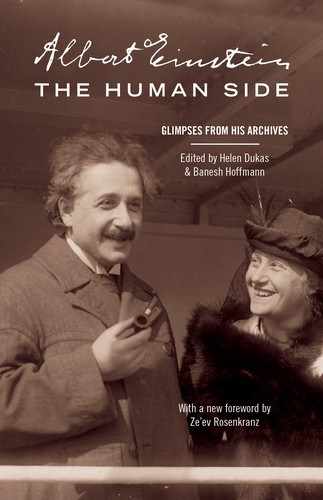EINSTEIN was an ardent Violinist, his violin being his inseparable companion. The composers of the eighteenth century were his favorites. He loved the music of Bach and Mozart. Beethoven he admired rather than loved, and he felt less rapport with later composers.
With fame came an intense and often annoying interest in all aspects of his life. So when a German illustrated weekly in 1928 sent him a questionnaire in Berlin about Johann Sebastian Bach it is not surprising that Einstein ignored it. The editor waited a while and then, on 24 March 1928, sent a second request. This time, on the very same day—the mails were faster in those days—Einstein answered brusquely as follows:
This is what I have to say about Bach’s life work: listen, play, love, revere—and keep your mouth shut.
__________
It so happened that later that same year a different publication asked Einstein about a different composer, and on 10 November 1928 Einstein replied as follows:
As to Schubert, I have only this to say: play the music, love—and shut your mouth!
__________
Some ten years later a more searching questionnaire about Einstein’s musical tastes arrived from a yet different source and this one he answered in more detail. The questionnaire seems to have been lost, but the questions on it can be inferred more or less from Einstein’s responses, which bear as date only the year 1939:
(1) Bach, Mozart, and some old Italian and English composers are my favorites in music. Beethoven considerably less—but certainly Schubert.
(2) It is impossible for me to say whether Bach or Mozart means more to me. In music I do not look for logic. I am quite intuitive on the whole and know no theories. I never like a work if I cannot intuitively grasp its inner unity (architecture).
(3) I always feel that Handel is good—even perfect—but that he has a certain shallowness. Beethoven is for me too dramatic and too personal.
(4) Schubert is one of my favorites because of his superlative ability to express emotion and his enormous powers of melodic invention. But in his larger works I am disturbed by a certain lack of architectonics.
(5) Schumann is attractive to me in his smaller works because of their originality and richness of feeling, but his lack of formal greatness prevents my full enjoyment. In Mendelssohn I perceive considerable talent but an indefinable lack of depth that often leads to banality.
(6) I find a few lieder and chamber works by Brahms truly significant, also in their structure. But most of his works have for me no inner persuasiveness. I do not understand why it was necessary to write them.
(7) I admire Wagner’s inventiveness, but I see his lack of architectural structure as decadence. Moreover, to me his musical personality is indescribably offensive so that for the most part I can listen to him only with disgust.
(8) I feel that [Richard] Strauss is gifted, but without inner truth and concerned only with outside effects. I cannot say that I care nothing for modern music in general. I feel that Debussy is delicately colorful but shows a poverty of structure. I cannot work up great enthusiasm for something of that sort.
__________
For the most part, as we see, the works of the modern composers of his day held little appeal for Einstein. However, he had high personal regard for Ernst Bloch, and on 15 November 1950, apparently responding to a request for a statement, he wrote this in English:
My knowledge of modern music is very restricted. But in one respect I feel certain: True art is characterized by an irresistible urge in the creative artist. I can feel this urge in Ernst Bloch’s work as in few later musicians.
__________
When the great conductor Arturo Toscanini was presented with the American Hebrew Medal in January 1938, Einstein wrote the following statement, which was presumably read aloud at the time of the presentation:
Only one who devotes himself to a cause with his whole strength and soul can be a true master. For this reason mastery demands all of a person. Toscanini demonstrates this in every manifestation of his life.
__________
In October 1928 a correspondent wrote to Einstein in Berlin asking him among other things whether his musical activity had any influence on his main field of work, which was so different. On 23 October 1928 Einstein replied as follows:
Music does not influence research work, but both are nourished by the same source of longing, and they complement one another in the release they offer.
![]()
